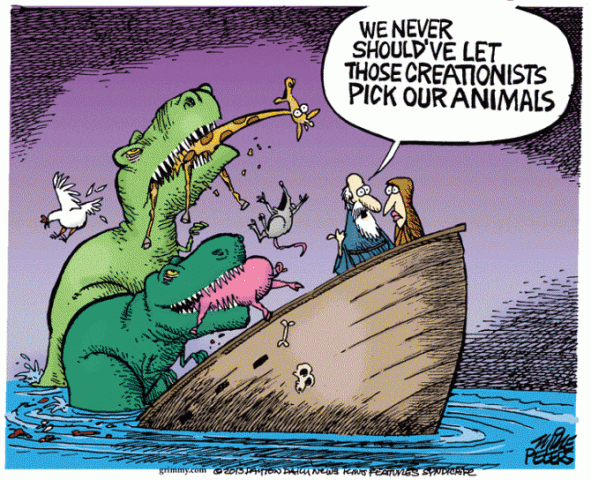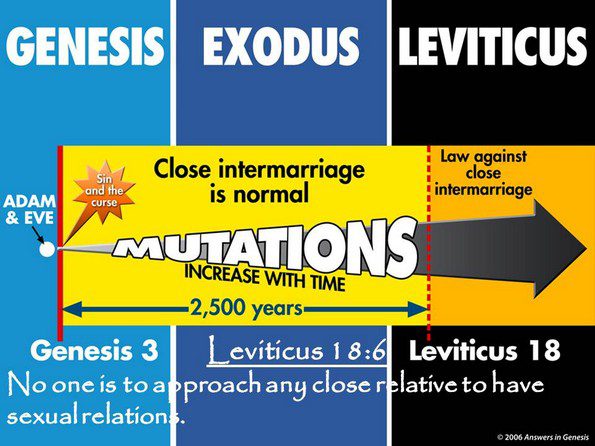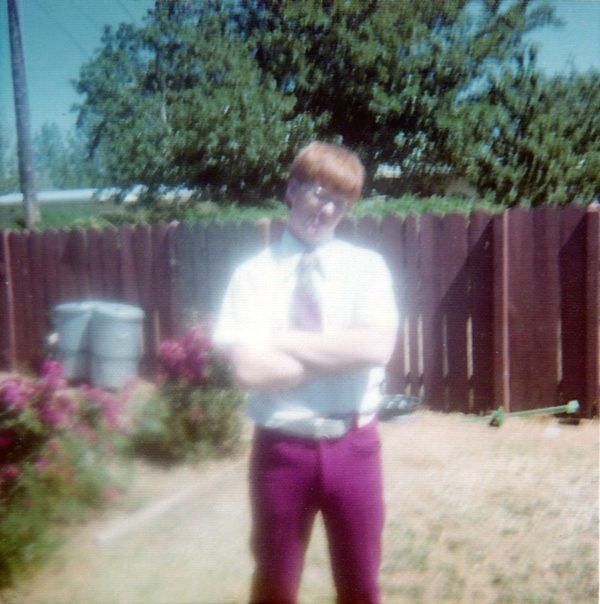
Years ago, I wrote a post titled Ken Ham Warns Atheists Are Out to Steal Your Children and Eat Them Too. While this post was lost in a server crash, I was able to recover the part of the post that resulted in Ken Ham asking his devoted Facebook followers to pray for me:
Teaching children the earth is 6,000 years old, that God killed with a flood every human being save eight a few thousand years ago, and that anyone who does not accept the Evangelical version of the Christian God will be tortured by the Evangelical God in hell for eternity, is quite harmful to the intellectual development of children.
The waiting rooms of mental health professionals are filled with people who have had their sense of self-worth damaged or destroyed by Christian teachings like original sin. Being told you are wicked, that you can be oppressed or possessed by Satan, and that God holds absolute power of your life, does not make for a healthy mind.
So, to Ken Ham, I say this: Yes we are coming for your children. We hope to expose them to the wide, wondrous universe we live in. We hope to teach them to think critically and not to accept something as fact just because a preacher said or God said __________________.
I am not anti-Christian or anti-religion. I am, however, anti-ignorance. I think parents hurt their children when they keep them from ALL the knowledge available about the universe and their place in it . . .
Instead of praying for me, the Hamites went on the offensive, and in doing so, they exposed their ignorance about atheism and their hatred for atheists. Here’s what some of Ham’s disciples had to say (all spelling and grammar in the original):
Start of Quotes
The level of pure hatred in their writings are almost palpable. They are the blind, leading the blind right into Hell!
Should not their own venomous hatred be a warning to them that they are not thinking clearly and rationally? How can they possibility imagine that they are walking in truth when they are eaten up with bitterness and loathing?
And as is highly typical of skeptics, they use lots of insults and personal attacks. In fact, insults are their personal mark and business card. Remember too – Satan is called the accuser of the brethren.
Sad for them. Their hearts are hardened.
evil is cancer…it spreads quickly everywhere…it destorys the ability to think or even reason…the worldly mind just cannot understand the wisdom of God. Praise God for grace.
So much anger and hatred. Just proves, in my mind, that this is a spiritual battle.
I really think the average Christian needs to have a better quick come back for the “God said” “God is speaking to me” and why the Bible is true… Those objections are voiced over and over again and I find the average Christian raised in our churches today simply has no good quick answer….
Jesus said we would be hated by this world because it hated Him first. Also all those who want to live a godly life in Christ Jesus will be persecuted.
“we are coming for your children.” Over my dead body.
“We are coming for your children” … Arrogant, conceited, rude and intrusive, aren’t they?
This may be the most difficult part of being a Christian, Ken: standing in the face of uncalled-for hatred. Perhaps we should all think of Jesus being nailed to the cross as we hear this kind of nonsensical hatred. Their pride will destroy them. Repentance is the only way….
While we MUST expose the wiles of the evil one, we must also remember that apart from the Grace of God, many of us would likely be in the same position they are in. Jesus warned us that in the End Times there would be a great deception and this is obvious. It is only by the Grace of God that we do not fall for this deception. We are indeed in a war and our enemy does not play fair. Fortunately, we fight with a Commander-in-Chief who also does not fight fair. Our Commander wins…PERIOD because he overcame death, sin, the grave, deception, and every other weapon the enemy throws at us. NO WEAPON formed against us shall prosper. The lies, the hate, the slander, the fear, all the weapons these atheists throw at us shall not prosper.
These atheists are not as secure as they present themselves to be. The truth of God’s Word dispels darkness. Be encouraged Ken. “But where sin abounded, grace abounded much more.” Romans 5:20
The claim that Bible belief and teaching retards the thinking of young people is not true. Since the Bible is true, that would be impossible! If science from the beginning had believed and searched the scriptures, there would have been more progress. For example, science once believed in bleeding people to make them feel better, a flat earth, and more. Bible knowledge would have prevented those errors of “science” along with the impossible theory of evolution – the “belief” that everything came from nothing with no influence from any power or intelligence. Now that’s retarded thinking.
And again we see the humanists’ “tolerance”!
I’m interested in reading these updates, but I’d like to follow up on something you wrote above. I have NEVER met anyone who hates God, ever. I’ve never heard anyone say that. They do hate us and our interpretation of God’s word (truth!).
Thank you for sharing. It is so sad that the lost cannot understand the truth and their deception turns their anger towards those who proclaim the truth. We need to understand those on the other side to know how to combat their influence.
Wow…such hatred. I think it is sad that the Christians use to be dogmatic, and that crowd was quiet, and now it has flipped around. They are dogmatic, and the Christians have become the quiet ones. And the gall of people like this to discredit all Creationists, and especially to discredit the credentials of scientists who are Creationists, is unjust. These scientists have payed for their education, and spent as much of their life in school, as the secular scientists, and so it is unjust to claim that these guys are dumb and stupid.
Never forget a man got up and walked out of the grave……….Atheists are such fools.
He needs to know that we don’t believe in the 7 day creation because a pastor said “God said,” but because God said! We need to stick to the word. Thanks Mr Ken.
if God is not real, why would I waste my time arguing or caring about what Christians thought….nothing meanings anything if there is no God….so I would spend my time in as much pleasure and selfishness as possible as I only have maybe 80 years of meaningless existence…I would not want to waste a second on science or Christianity…who cares?…the fact they oppose so strongly shows they are scared and insecure in their own beliefs
I asked a few Athiest once, why do you talk about God so much if God doesn’t exist? Why do you mock it? An Athiest told me its because of all the violence and wars. And I asked if that is true. Why is it a Christian God and not any other gods, for example Allah the god of Islam?.. I have personally paid attention to the media and tv shows that would make fun of religion. And also been in Philosophy classes where they would bring up a Christian God most of the time. Even they say Christianity copied other religions when it was the other way around they pic and choose things. Indeed we are living in the End times I believe. More Christians are being persecuted there was/still is being more Christians being persecuted in the last century than the 1900 years after 0A.D all together. The Lord has really told me that He is my shield. And to have full Faith in Him. As I’ve been reading Scripture lately.
End of Quotes
Here’s my favorite comment, written by Don Swaringen, a 1961 graduate of Bob Jones University :
The claim that Bible belief and teaching retards the thinking of young people is not true. Since the Bible is true, that would be impossible! If science from the beginning had believed and searched the scriptures, there would have been more progress. For example, science once believed in bleeding people to make them feel better, a flat earth, and more. Bible knowledge would have prevented those errors of “science” along with the impossible theory of evolution – the “belief” that everything came from nothing with no influence from any power or intelligence. Now that’s retarded thinking.
Let’s see:
- “The claim that Bible belief and teaching retards the thinking of young people is not true.” Why? The “Bible is true,” Swearingen says. Talk about circular reasoning: the Bible is true because the Bible says it is true.
- Bloodletting? A procedure performed on the sick for 1,900 years, long before the modern scientific era. Christian doctors bled numerous Christians and clergymen. All of them had the Bible at their disposal, yet none of them found the “truth” about bloodletting. It took scientists, not theologians, to find out that bloodletting does not help the sick.
- Flat earth? Evidently, Swaringen is not aware that the flat earth belief came, in part, from the Bible: Daniel 4:10, Isaiah 11:12, Revelation 7:1, Matthew 4:8
- There would be more progress if science believed the Bible? Really? What about the scientists who were killed for going against the Bible and the Christian church’s teachings? What does history tell us about countries that have a religious-text-based science? Look at the Muslim world and see what happens when theology trumps science.
- Science does make errors, but it corrects them. When’s the last time the Don Swaringens of the world have “corrected” an error in their Bible or theology? Everyone together now . . . NEVER!
Bruce Gerencser, 66, lives in rural Northwest Ohio with his wife of 45 years. He and his wife have six grown children and thirteen grandchildren. Bruce pastored Evangelical churches for twenty-five years in Ohio, Texas, and Michigan. Bruce left the ministry in 2005, and in 2008 he left Christianity. Bruce is now a humanist and an atheist.
Connect with me on social media:
Your comments are welcome and appreciated. All first-time comments are moderated. Please read the commenting rules before commenting.
You can email Bruce via the Contact Form.









